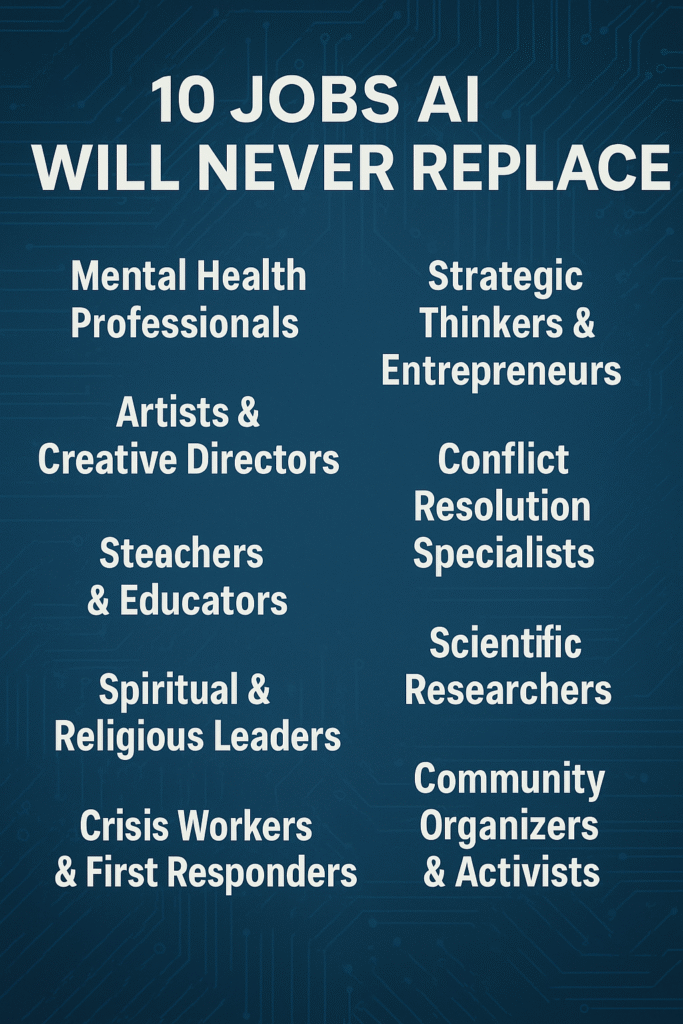Introduction: Not All Jobs Are on the Chopping Block
While headlines scream that AI is coming for everyone’s jobs, the truth is more nuanced. AI is incredibly powerful — but it has limits. In fact, there are whole industries and professions that are not just safe from automation, but are expected to grow because of it.
The question isn’t just “Will AI take my job?” — it’s “Is my job uniquely human?”
In this article, we’ll explore 10 types of work that are resistant to automation and explain why humans are still irreplaceable in these roles.
💼 1. Mental Health Professionals
Why AI Can’t Replace It:
Therapists, psychologists, and counselors don’t just listen — they interpret, adapt, and empathize. Emotional intelligence is hard-coded into human experience, not AI algorithms.
Even the best chatbots lack:
- Genuine empathy
- Cultural nuance
- Emotional safety
Future Outlook:
🔼 Demand is rising, especially for trauma-informed and culturally competent care.
🎨 2. Artists & Creative Directors
Why AI Can’t Replace It:
AI can generate art — but only based on what already exists. It doesn’t have lived experience, intention, or emotional backstory.
Art isn’t just visual — it’s emotional storytelling.
Creative directors shape brand identity, aesthetic trends, and cultural relevance. AI tools can assist, but not lead.
🧠 3. Strategic Thinkers & Entrepreneurs
Why AI Can’t Replace It:
AI is reactive, not visionary. It doesn’t innovate, forecast abstractly, or take meaningful risks. Founders and strategic leaders solve problems no one’s ever solved — AI can’t do that without precedent.
Entrepreneurs build new value systems. AI just optimizes what already exists.
💬 4. Conflict Resolution Specialists
Why AI Can’t Replace It:
Mediators, negotiators, and HR leaders manage complex human emotions and group dynamics. These jobs require reading subtext, interpreting intent, and adjusting strategies in real time — far beyond what AI can do.
🛠️ 5. Skilled Trades (Electricians, Plumbers, Mechanics)
Why AI Can’t Replace It:
Robots may assist with repetitive labor, but unpredictable real-world environments — like broken wiring in old buildings — require human adaptability.
Blue-collar doesn’t mean obsolete. In fact, skilled trades are booming in the AI age.
🏫 6. Teachers & Educators (Human-Centered Roles)
Why AI Can’t Replace It:
AI can generate lessons, but great educators inspire, challenge, and guide. Human teachers understand emotional context, classroom energy, and motivation in ways machines cannot.
Students need connection — not just curriculum.
🧘 7. Spiritual & Religious Leaders
Why AI Can’t Replace It:
AI can mimic spiritual texts — but faith is deeply human. People don’t seek AI for pastoral care, rituals, or existential guidance. This role is rooted in tradition, trust, and shared cultural experience.
📋 8. Crisis Workers & First Responders
Why AI Can’t Replace It:
Whether during a flood, fire, or medical emergency, unpredictability reigns. These jobs demand rapid problem-solving, moral decision-making, and human compassion.
No robot can replace someone who chooses to run into danger to save others.
🧪 9. Scientific Researchers
Why AI Can’t Replace It:
AI can process data — but researchers form hypotheses, ask why, and design experiments. True scientific advancement involves leaps of intuition, lateral thinking, and ethical judgment.
AI supports science, but humans drive discovery.
🤝 10. Community Organizers & Activists
Why AI Can’t Replace It:
Movements are built on trust, emotion, and human connection. Organizing isn’t just logistics — it’s about shared vision, storytelling, and belonging.
AI can’t rally people around a cause. Humans can.
🔁 Bonus: What These Jobs Have in Common
All of the above careers share traits that AI struggles with:
- Empathy
- Creativity
- Ethics
- Adaptability
- Emotional engagement
These roles are grounded in meaning, connection, and human messiness — the exact things AI can’t simulate.
✅ Final Thought: Be Irreplaceably Human
If your job is task-based and predictable, it might be time to evolve. But if your role requires heart, complexity, and innovation, you’re already ahead of AI.
AI won’t replace humans — but humans without humanity might replace themselves.
So ask not just what you do — but how human you are when you do it.
